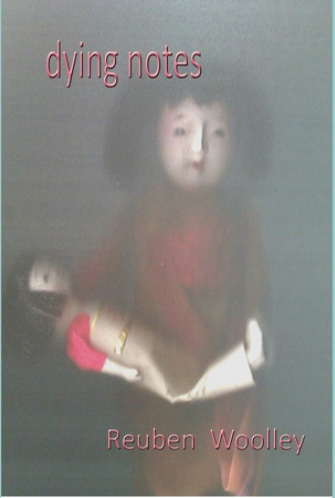
In what way can it be said, or indeed written, that notes die? Reuben Woolley understands that death must be noted and it is in their dying that poetry has the notation to attempt it. Notes die into silence, into the impossibility of saying, for example, the holocaust. But death is always waiting until ‘It’s time / to die completely’ [epistle] and Woolley faces up to the impending with a bravura that is unsettling.
was silence in question? or is that simply too easy a to be simple?
In a poem entitled epistle he asks ‘was silence in questions’ (no question mark) as the dead ‘write no letters’ . Here silence is in the written rather than the heard (‘Thou shalt make no graven images’). In order to write the poet must live beneath the surface, at the point where the letter dies, ‘it’s nerve under skin / rivers under asphalt’ […] or hidden’ [circulation] Woolley writes:
‘I put up a sign / i said i told you
should’ve said
nothing should’ve
known
you’d feel the air
touch
the curly mind
inside [strata]
Death is always one step under or ahead and it is this that makes it real, deadly.
it comes
like a still sea
whispering threats [playgrounds]
Woolley’s writing is ‘aiming at shadows’ [one down, three to go] ‘where spaces are danger’ [knife edge]
Letters are black tombs in snow on the silence of snow as Celan has noted and even they list at strange angles. Woolley knows only too well to be careful of syntax and punctuation as they speak more than the words they enclose.
This poetry is heir to Celan, with shades of Blanchot and Neruda (not to e e cummings that it so resembles). It is compact and intense but obeys Oppen’s dictum that ‘I have not and never did have any motive of poetry / But to achieve clarity’. Perserverance here will prove rewarding.
It is a pity that this chapbook leaves something to be desired in terms of typography. Woolley’s work is meticulously crafted so that the caesurae, punctuation and lineation speak as much or more than the words themselves. The silence also needs attention. As he writes: ‘I am […] room to breathe’ , yet this volume is too squeezed. His debut, ‘The King is Dead’ published by Oneiros is more sympathetic to this aspect of his work. dying notes, however, does begin to establish him as a voice to be reckoned with.
David Pollard‘s most recent collection is Finis-terre from Agenda Editions.
Buy your copy of dying notes by Reuben Woolley from erbacce-press, here: http://erbacce-press.webeden.co.uk/#/reuben-woolley/4590077522
